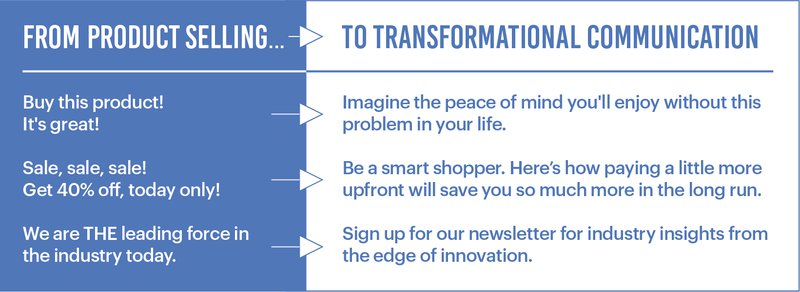In a climate of change, transformational messaging sells
Reshape perceptions & enhance connections with communications designed to transform.
Top Takeaways from this Article
- Transactional selling is when you message your product or service.
- Transformational selling is when you message the emotional output of your product or service.
- A transformed mindset is sustained with ongoing content.
- Transformational brands enjoy the ROI of premium price points, increased client retention and advocacy, while transactional brands live in a constant cycle of incentives and discounts.
My Transformation from Traditional Copywriter to Content Marketer
It's been over two decades since I first set foot into an advertising agency. My early years were spent perched at a cube inside an integrated marketing communications firm where I learned how to write brochures and ads to sell checking accounts, mattresses and shower heads, among other household items. Later, after a few years of freelancing around the country, I was hired by another firm, this time an honest-to-goodness ad agency led by a modern-day Don Draper. Here, three martini lunches were common and creative awards were valued almost more than ROI, although I learned that the two often go hand in hand.
These experiences, and the client successes that followed, shaped my perceptions about the two constants of successful marketing: a strong sales message and one hell of a media buy. Right? Well, maybe...until things started to change when the phrase content marketing entered our ethos. I was skeptical at first. What role could storytelling play in a world of snappy headlines and benefits bullets? I didn't realize I'd already been dabbling in the field on behalf of GE Lighting, our biggest client at the time. We used educational videos, interactive tools and downloadable worksheets as a disruptive alternative to an annual Earth Day campaign that was formerly fueled by coupons and print ads.
This content-based strategy, called Project Plant-a-Blub, required the same investment of the traditional ad campaign and delivered above and beyond the two-week Earth Day window, resulting in many months of lingering visibility, extensive press coverage and more than ten times the impressions over the previous year. The content we created for the campaign landing page convinced hundreds of thousands of consumers to make the switch to CFL bulbs. We followed up with a "Design with Light" campaign to inspire homeowners to think about lighting as an easy way to refresh home décor, shifting lighting from a reactive to a proactive purchase.
These campaign experiences transformed me from a traditional copywriter to content marketer. My resolve only strengthened with the rise of Content Marketing Institute (CMI) and their annual reporting that showed year-over-year increases in brand participation and global success.
Transactional vs. Transformational Communication
With the win of Project Plant-a-Bulb, I discovered that changing consumer mindset is much more exciting (and profitable!) than simply selling a product. I've since used content marketing to help clients convince audiences that:
- You can use cannabis to safely manage pain and treat skin issues without getting high.
- You should never accept incontinence as a natural part of growing older.
- Your potential as a leader is limitless when you connect with a community.
- Your dollars have a profound impact on the quality of our local neighborhoods.
- You'll be happier and more productive if you strengthen your own resilience.
You'll notice that these points are not product pitches, although they do set up for the purchase of a product, membership or service. They're statements that enlighten and engage with emotional impact. Behind each claim is a series of stories that demonstrate its truth. Customers are smarter than ever and hungry for information. Just like my own marketing transformation that was sustained with weekly newsletters from CMI, you have the power to reshape perception with focused and frequent communications that are designed to transform.
Consider ways you can shift your messaging from transactional to transformational. Transactional marketers expect an immediate leap from first impression to conversion. When was the last time you made a purchase without researching it first? You'll notice that each statement in the transformational category below opens the door to a meaningful conversation with prospects. This is a conversation strategically designed to transform any misperceptions or obstacles they have to buy, and empower them to make the smartest decision possible.

The ROI of Transformational Communication
When brands shift from a transactional sales approach to a transformational communication strategy, they're more likely to see meaningful outcomes beyond the point of purchase. Transformational brands deliver value to their audiences before they expect to extract value. They're patient. They're thoughtful. In return, they generally charge more for their products or services. And they're still rewarded with steadfast customer loyalty and raving advocacy.
This is not to say that traditional sales techniques like discounts and feature/benefit selling don't have a place in marketing today. We deploy plenty of incentive messaging and testimonials at low stages of the funnel. These tactics are especially effective in re-marketing, once someone has shown interest. But starting with the transaction is similar to a one-night stand. It might satisfy an urge, but it may not be your best approach for a sustainable, long-term relationship. (I said this in a boardroom once and was counseled for being crass – but the point was made…and minds were changed!)
Muse is more than a marketing firm, we're a change agency. Our proven method harnesses best-practice communication strategy as a means to transform mindset, behavior, and even business models. In times like today, clear, emotive-based communication is one of the most valuable tools you have to bring about the change you want to see in the world.
About the Author
Jackie Bebenroth is Founder and Chief Brand Advisor of Muse. She works alongside leading brands and executives to develop strategic positioning and messaging strategies that set the stage for long-term success. Her work, from local restaurant branding to six-figure global initiatives, has flown her around the country to speak on the art of content marketing. Jackie has earned a number of accolades, most notably a SXSW Interactive finalist award, the American Advertising Federation’s 40 under 40 award and Content Marketing Institute’s Content Marketing Leader of the Year.
More Good Reads

How to Write an RFP for a Non-Profit Rebrand
Our step-by-step guide for how to write an RFP streamlines the complex. Apply these insights to your next project request.

How Long Does It Take to Rebrand?
Many factors influence a rebranding timeline. Learn how long it can take to rebrand your business.

